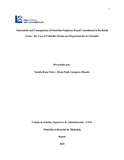Antecedents and consequences of front-line employee brand commitment in the retail sector : the case of Falabella tiendas por departamiento in Colombia
Fecha
2018-06Citación
Metadatos
Mostrar el registro completo del ítem
Documentos PDF
Resumen
El presente trabajo de investigación pretende responder a preguntas: ¿cómo pueden los minoristas aprovechar los recursos internos para ayudar a apoyar su desarrollo? ; ¿cómo la identidad de marca y la claridad de rol de FLE impactan el compromiso de la marca y qué impacto tiene el compromiso de la marca en el comportamiento y la satisfacción laboral FLE? Para lograr responder estas cuestiones, las autoras utilizan IRBBB para representar el comportamiento de la marca y proponen un modelo diseñado para tener en cuenta las características de la marca y los recursos humanos que ayudan a explicar cómo se puede engendrar el comportamiento de marca (IRBBB) a través del compromiso de los empleados.
Resumen
Brands are considered to be relationship builders for service organizations because of the intimate bond they create with customers. In order for this relationship to thrive, the brand promise needs to be fulfilled at each service encounter. Some studies of the relationship marketing literature have determined that the firm–employee relationship is a prerequisite to the customer–firm relationship and, consequently, to organizational success (Herington, Johnson, & Scott, 2006). The development of this relationship can be particularly challenging for retailers due to the high degree of complexity inherent to the service component of the environment where they normally operate. This complexity is further compounded by factors such as variable employee performance and the strong connection that exists between production and consumption in the retail context (Devlin, 2003).
Colecciones
El ítem tiene asociados los siguientes ficheros de licencia:


